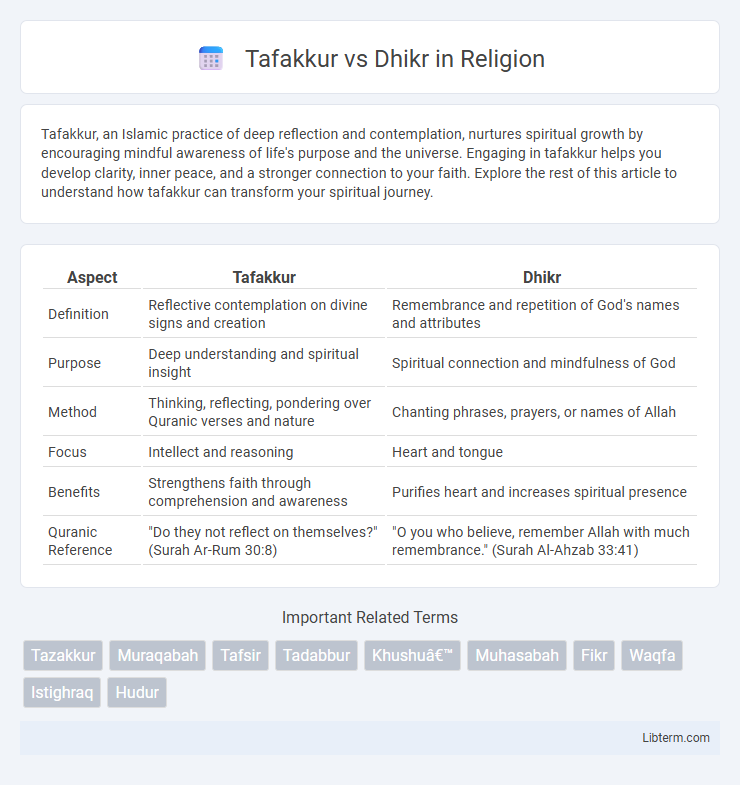Tafakkur, an Islamic practice of deep reflection and contemplation, nurtures spiritual growth by encouraging mindful awareness of life's purpose and the universe. Engaging in tafakkur helps you develop clarity, inner peace, and a stronger connection to your faith. Explore the rest of this article to understand how tafakkur can transform your spiritual journey.
Table of Comparison
| Aspect | Tafakkur | Dhikr |
|---|---|---|
| Definition | Reflective contemplation on divine signs and creation | Remembrance and repetition of God's names and attributes |
| Purpose | Deep understanding and spiritual insight | Spiritual connection and mindfulness of God |
| Method | Thinking, reflecting, pondering over Quranic verses and nature | Chanting phrases, prayers, or names of Allah |
| Focus | Intellect and reasoning | Heart and tongue |
| Benefits | Strengthens faith through comprehension and awareness | Purifies heart and increases spiritual presence |
| Quranic Reference | "Do they not reflect on themselves?" (Surah Ar-Rum 30:8) | "O you who believe, remember Allah with much remembrance." (Surah Al-Ahzab 33:41) |
Understanding Tafakkur: The Art of Reflection
Tafakkur, the art of reflection, involves deep contemplation on the signs of creation and the divine wisdom behind them, fostering spiritual insight and self-awareness. Unlike Dhikr, which emphasizes the repetitive remembrance of God's names or attributes, Tafakkur encourages thoughtful meditation and intellectual engagement with faith. This reflective practice enhances a believer's understanding, connecting the heart and mind to the broader Islamic teachings and the natural world.
Unpacking Dhikr: The Practice of Remembrance
Dhikr, the Islamic practice of remembrance, involves the repetitive utterance of divine names and phrases to cultivate mindfulness of Allah. This meditative exercise deepens spiritual connection and cleanses the heart by reinforcing the presence of God in everyday life. Unlike Tafakkur, which emphasizes reflective contemplation on creation and divine wisdom, Dhikr centers on direct invocation to instill inner tranquility and divine awareness.
Qur’anic Foundations of Tafakkur and Dhikr
Tafakkur and Dhikr are deeply rooted in the Qur'an, emphasizing reflection and remembrance as pathways to spiritual growth. Tafakkur involves contemplative meditation on the signs of Allah in creation, as highlighted in verses like Surah Al-Imran (3:191), promoting intellectual engagement with divine wisdom. Dhikr refers to the repeated invocation of Allah's names and attributes, underscored in Surah Al-Ahzab (33:41-42), reinforcing constant mindfulness and connection with God through verbal remembrance.
Spiritual Outcomes: Comparing Tafakkur and Dhikr
Tafakkur deepens spiritual insight by encouraging reflective contemplation on divine signs, fostering personal growth and inner transformation. Dhikr enhances spiritual presence and connection through repetitive remembrance of God, cultivating tranquility and strengthened faith. Both practices complement each other, balancing intellectual reflection with heartfelt devotion for holistic spiritual development.
Historical Perspectives: Scholars on Tafakkur and Dhikr
Early Islamic scholars such as Al-Ghazali and Ibn Arabi emphasized the complementary roles of tafakkur (deep reflection) and dhikr (remembrance of God) in spiritual development, highlighting tafakkur as a way to internalize divine knowledge while dhikr sustains heart purification. Commentators like Imam Al-Qushayri documented how Sufi traditions integrated tafakkur and dhikr to balance intellectual contemplation with devotional practice. Historical texts reveal tafakkur as a method for understanding Qur'anic wisdom, whereas dhikr was prescribed to nurture constant awareness of God's presence.
Integrating Tafakkur and Dhikr in Daily Life
Integrating tafakkur (contemplation) and dhikr (remembrance) in daily life enhances spiritual awareness by combining reflective thought with conscious invocation of God's names. Regular practice of tafakkur deepens understanding of divine wisdom, while dhikr reinforces connection through repetitive praise, creating a balanced spiritual rhythm. This integration supports mental clarity and emotional tranquility, fostering a holistic approach to faith and mindfulness.
Psychological Benefits of Tafakkur vs Dhikr
Tafakkur, the deep reflective contemplation on the signs of Allah, enhances cognitive processing and emotional regulation by fostering mindfulness and self-awareness, which can reduce anxiety and depression. Dhikr, the repetitive remembrance of Allah's names, induces a meditative state that lowers stress levels, stabilizes heart rate, and promotes tranquility through neurophysiological mechanisms linked to relaxation responses. Together, Tafakkur strengthens mental clarity and insight, while Dhikr provides soothing rhythmic focus, both contributing uniquely to improved psychological resilience and spiritual well-being.
Common Misconceptions about Tafakkur and Dhikr
Tafakkur and Dhikr are often misunderstood as mutually exclusive practices, whereas Tafakkur involves deep reflection on the signs of God, and Dhikr emphasizes the repetitive remembrance of God's names and attributes. A common misconception is that Tafakkur is purely intellectual, ignoring its spiritual dimension, while Dhikr is mistakenly viewed only as vocal chanting, neglecting its meditative aspects. Both practices complement each other by fostering cognitive awareness and heartfelt devotion in Islamic spirituality.
Practical Techniques for Enhanced Tafakkur and Dhikr
Effective tafakkur involves focused contemplation on Quranic verses and the creation of Allah, utilizing techniques such as journaling reflections and engaging in nature observation to deepen understanding. Practical dhikr practices include the use of prayer beads (misbaha) for repetitive recitation of divine names and phrases like "SubhanAllah," "Alhamdulillah," and "Allahu Akbar" to cultivate mindfulness and spiritual connection. Combining these methods enhances cognitive retention and emotional tranquility, fostering a balanced spiritual routine.
Harmonizing Reflection and Remembrance for Spiritual Growth
Tafakkur, or deep reflection, and Dhikr, the remembrance of God, jointly foster spiritual growth by balancing intellectual contemplation with heartfelt devotion. Tafakkur nurtures understanding through meditation on divine signs and personal experiences, while Dhikr sustains connection through repetitive invocation of God's names and attributes. Harmonizing these practices cultivates a holistic spiritual presence that deepens faith and enhances inner tranquility.
Tafakkur Infographic

 libterm.com
libterm.com